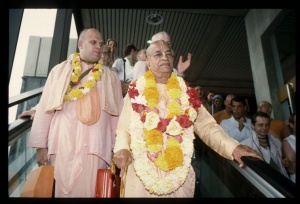SB 1.13.44

A.C. Bhaktivedanta Swami Prabhupada
TEXT 44
- yan manyase dhruvaṁ lokam
- adhruvaṁ vā na cobhayam
- sarvathā na hi śocyās te
- snehād anyatra mohajāt
SYNONYMS
yat — even though; manyase — you think; dhruvam — Absolute Truth; lokam — persons; adhruvam — nonreality; vā — either; na — or not; ca — also; ubhayam — or both; sarvathā — in all circumstances; na — never; hi — certainly; śocyāḥ — subject for lamentation; te — they; snehāt — due to affection; anyatra — or otherwise; moha-jāt — due to bewilderment.
TRANSLATION
O King, in all circumstances, whether you consider the soul to be an eternal principle, or the material body to be perishable, or everything to exist in the impersonal Absolute Truth, or everything to be an inexplicable combination of matter and spirit, feelings of separation are due only to illusory affection and nothing more.
PURPORT
The actual fact is that every living being is an individual part and parcel of the Supreme Being, and his constitutional position is subordinate cooperative service. Either in his conditional material existence or in his liberated position of full knowledge and eternity, the living entity is eternally under the control of the Supreme Lord. But those who are not conversant with factual knowledge put forward many speculative propositions about the real position of the living entity. It is admitted, however, by all schools of philosophy, that the living being is eternal and that the covering body of the five material elements is perishable and temporary. The eternal living entity transmigrates from one material body to another by the law of karma, and material bodies are perishable by their fundamental structures. Therefore there is nothing to be lamented in the case of the soul's being transferred into another body, or the material body's perishing at a certain stage. There are others also who believe in the merging of the spirit soul in the Supreme Spirit when it is uncovered by the material encagement, and there are others also who do not believe in the existence of spirit or soul, but believe in tangible matter. In our daily experience we find so many transformations of matter from one form to another, but we do not lament such changing features. In either of the above cases, the force of divine energy is uncheckable; no one has any hand in it, and thus there is no cause of grief.